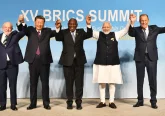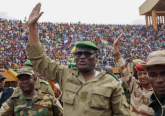Margot Wallstrom, the United Nation’s special representative on sexual violence in conflict, referred to the Democratic Republic of Congo (DRC) as ‘the rape capital of the world’. If my Google search was any indication (registering a disturbing 4,640,000 hits for the term), the sensationalist phrase stuck among members of the civil society and aid agencies in the Global North. The eastern DRC has alternately been described as ‘the worst place in the world for women’ by The Guardian and ‘hell’ by American feminist playwright Eve Ensler.
US Secretary of State Hillary Rodham Clinton called rape in the DRC ‘evil in its bases form’ during a visit to the region in 2009. There is something to be said about the damaging effects of such moral aggrandising on the subject of the pain and suffering of others and the way in which the discourse of moral recourse situates the speaker in a position of power vis-a-vis both the survivor and the perpetrator.
Indeed, there is a well-developed trend in the Global North to focus on the issue of rape in the DRC (see Eve Ensler’s call for an end to report-making of rape in the Congo and a move towards action, titled “Over”). Following on the heels of this trend, the US Africa Command (USAFRICOM or AFRICOM, which is responsible for US military operations and military relations with all African nations excluding Egypt since its establishment in October of 2008) funded field research on combatant rape in the DRC. A transcript of a presentation given by two of the lead researchers, Dr. Lynn Lawry and Dr. Michele Wagner, was released on the AFRICOM website in January 2011. My critique of the research is drawn from this transcript.
There are some foundational dilemmas with the framework of the study. First, there is no context of the resource pillage and mineral exploitation (coltan, diamonds, copper, cobalt and gold) of transnational corporations which helps to sustain the conflict in the DRC. The conflict in the DRC is, as Stephen Lewis so aptly put it, ‘an act of criminal international misogyny, sustained by the indifference of nation states and the delinquency of the United Nations’. There is no mention of the CIA-backed assassination of the first elected Prime Minister of Patrice Lumumba in the report, nor the subsequent installation of Mobutu Sese Seko as Prime Minister (who would ensure that the natural resource wealth of the DRC remained available for global capital plunder). There is no mention of the history of colonialism or neocolonialism (particularly important in understanding the Rwandan genocide and its spill-over into the DRC), although, predictably, there are numerous references to the role of ethnicity as a causality of the conflict.
Second, the research demonstrates a continuation of the trend to sensationalise the issue of sexual violence in the DRC. During her presentation, Dr. Lawry says, ‘Now, if you don’t hear anything else that I’m about to say or that I’ve said, listen to the next one. And it’s — I’m sorry that it’s the last bullet on the slide, but this is the kicker. When we asked survivors what the sex of their perpetrator was, 40 percent of women said that their perpetrator was female, and 15 percent of men said their perpetrator was female… And what are we talking about? Women raping men? They’re using instrumentation, cutting off genitals, requiring to have bush wives — I mean bush husbands — as combatants in combatant rebel groups. So it does exist. Next slide.’
The implication from her words is that for the audience of US military personnel, the female gender of some of the perpetrators of sexual violence is the most vital revelation of the research. ‘If you don’t hear anything else that I’m about to say or that I’ve said, listen to [this]’, she says, women can and do rape, too. And what is more (she goes on to demonstrate), men are sexually assaulted. Indeed, Dr. Lawry presents her findings as groundbreaking in their revelation that sexual violence in the DRC is ‘not just a female problem [and that] men also actually suffer sexual violence’. In fact, male sexual assault in the DRC has been addressed in the past (see “Symbol of Unhealed Congo: Male Rape Victims” by Jeffrey Gettleman, for an example).
The US Africa Command-funded study focuses on understanding ‘combatant-related’ sexual violence among survivors in the DRC in order to support US military operations in their effort to ‘break the cycle of violence’.
According to Dr. Lawry the study ‘has bearing on security [both] in the region and in the continent’. At another point during the presentation Q&A, Dr. Lawry refers to the importance of the study because it is ‘an issue that is, you know, widespread around the continent’. This generalisation is troubling for a couple of reasons.
First, it implies that data gathered from research in the DRC will be employed in formulating protocol for AFRICOM across the continent of Africa. This hypothesis is supported when, after the research presentation, a member of the audience declares, ‘There’s going to be a tremendous tendency amongst the engagement planners, people like me and my staff, to rely heavily on the research in DRC… and apply it in other countries as best as we can. I get that. (Laughter.) You’re all we’ve got. And then the only real comment I’d add is we have neither the staff capacity nor the resources to do this research in every country’. There is a clear problem of assuming that research conducted in the DRC will be helpful in implementing logistics-training programs in other African countries. But there is still almost no clarity of how the material from the study will inform US military engagements and procedure in any concrete sense, even in the DRC itself.
So, while it demonstrates that AFRICOM will be engaging in ‘sexual abuse prevention’ and training seminars for African military personnel, we are not exactly sure what form these interventions will take. Although Dr. Lawry comments that US military personnel are ‘going to do logistics… It’s similar to when you’re a physician and you’re in a clinic and you talk to a patient and you go through the medical history. You just ask [the possible sexual assault survivor], is there anything I need to know about sexual abuse in the past? If you pussyfoot around it [the issue of rape]… becomes this taboo issue. It’s better just to go into it and to say, now we’re going to talk about an issue that is, you know, widespread around the continent. It’s not that they don’t know that already’.
Again, her methodology is both presumptuous and disrespectful to the lived experience of sexual abuse. Despite the fact that in her presentation she is clear of the influx of aid workers and researchers from the Global North coming into communities in the DRC to question abuse survivors (she reveals, for example, that only oral permission is obtained because the act of signing a document has taken on the meaning that the signer is entitled to some form of aid), she believes that US military personnel should be direct (and, it would seem, demanding) about the subject of sexual assault. They should, according to her, avoid ‘pussyfoot[ing] around’. Her language devalues the survivors’ complex experiences and emotions. Congolese women and African feminists have been actively involved in breaking the silence of sexual violence on their own terms (see testimonials at City of Joy). The AFRICOM-commissioned study perpetuates victimisation by presuming to act in the best interest of survivors of sexual abuse with no regard to these voices.
Second, what capacity does the US military have to engage in preventative training or community psychotherapy to heal survivors of combatant related sexual violence? This question is particularly important when we consider sexual violence within the US military itself. In fact, at no moment in the presentation nor the research paper is there any mention of the prevalence of sexual assault within the US military iteself, perpetrated by US service personnel against their brothers and sisters in arms (called ‘military sexual trauma’ or MST).
Sexual violence is widespread in the US military. Dahr Jamail’s 2010 article, “Rape Rampant in US Military”, discusses on the ‘extreme shame and trauma’ experienced by US military personnel who have survived sexual violence, as their stories all too often go unheard or are blatantly disregarded by the military (see also the documentary exposé “The Invisible War”, on the subject of US military inaction towards sexual violence within the armed forces).
Susan Avia-Smith, founder of the US veteran’s advocacy group VET-WOW in Seattle, Washington, revealed in an interview on Al Jazeera, ‘People cannot conceive how badly wounded these [US veterans] are. Combat trauma is bad enough, but with MST it’s not the enemy, it’s our guys who are doing it [‘it’ being sexual abuse]. You’re fighting your friends, your peers, people you’ve been told have your back. That betrayal, then the betrayal from the command is, they say, worse than the sexual assault itself’.
One study reports that as many as one in three US female service members has been sexually assaulted by a fellow service member. A study released in March 2011 revealed that one in 15 men in the US Air Force has reported being sexually assaulted. The Pentagon has consistently refused to release records that reveal the extent of sexual assault in the US military, this is particularly the case for male survivors of sexual assault.
Sexual violence is part of the structure of militarism. This blog entry does not allow sufficient space to discuss the range of different forms that the culture of sexual violence has taken in the military. Suffice it to mention the Abu Ghraib prison abuse (when photos were leaked in 2004 revealing US military servicemen posing obscenely near the tortured, often nude, bodies of prisoners) and the more recent release of video showing US servicemen urinating on the bodies of dead Taliban fighters in Afghanistan. Add to this a mention of the extensive studies that have been done – particularly in Asia Pacific – on the culture of sexual exploitation on and around US military bases, manifested through the increased occurrence of sex work, sex trafficking and sexual violence in these areas (see research on US military bases and sexual abuse in South Korea, Philippines and Japan).
I am reminded of the story of one of my own acquaintances, while at Officer Candidate School (OCS) in Quantico, Virgina, where he watched his drill instructor touch the genitals on the corpse of a dead deer, laughing that it was a fellow officer candidate. My friend told me stories about singing derogatory chants on marches that included words like ‘pussy’ and ‘dyke’ and glorified heterosexual exploits. Yet, there is a remarkable historical and cultural amnesia within the AFRICOM study on sexual violence in the DRC that totally ignores the issue of widespread sexual violence within the US military, while presuming to know how Congolese should approach their own healing from sexual trauma.
My critique of the AFRICOM-commissioned study of combatant sexual violence in the DRC does not disregard the serious need for protection from and awareness of sexual violence. I am moved by Marame Gueye’s words for the future. In, African Women Writing Resistance, she writes, ‘I would like to see African women who have suffered male violence living free of trauma and psychological trouble. They should not see themselves as victims or feel guilty and shamed… I envision a world of empowerment for African women, with libraries and meeting centers offering literacy programs, training programs, and counselling programs that help women to flourish. I would like to see a world where Congolese women, and all African women, have access to public lectures and materials on women’s rights’.
There is a very real need to acknowledge the various forms of sexual violence during conflict and the complicated gender dynamics within them. I question, however, the capacity of the US military to implement any lasting reforms towards these ends.
A more holistic approach – one capable of ending sexism and sexual violence within military practices – would be to acknowledge the values intrinsic in militarism that condone and promote an idea of hypermasculinity, which is determined upon one’s ability to express power through the devaluation of others by committing acts of violence.
Amber Murrey is a Dphil candidate in the Department of Geography and the Environment at the University of Oxford.








2 Comments
It is not enough and can not solve rape problem by reffering to D R C as the rape capital of the world or the worst place in the world for women and girls and yet you are not supporting existing actions in other Countries that can work to save them from rape as the conflict is technically over. To break the cycle of violence has to involve women and girls and this is to empower them with practical prevention and self defense skills because the rule of law has been weakened and destroyed and can`t be relied upon.Over 80% rape cases can be prevented through such interventions and that is why if other approaches have become useless in saving the women and girls from rape,we need to intruduce new ones that are innovative and can work to save women and girls as we are doing in Kenya and as we intruduced the first ever self defense program in Bukavu where over 50 trainers were trained and now making a difference back in their communities to help women and girls combat rape on their own.
Thank you
Duncan
Program Officer
Dolphin Anti rape and AIDS Control Outreach,Nairobi,Kenya
Email:dolphin2002ke@yahoo.com
Dear Duncan,
Thank you very much for your comments and for sharing your organisation’s website. I visited the Dolphin Anti Rape Outreach page and it looks to be an exciting initiative.
Dolphin’s focus on preventative education focuses on empowerment, as these are the types of grassroots initiatives that acknowledge people’s human capacities and agencies to take action against violence. This is a completely different approach than that taken by US AFRICOM.
I was wondering: is your organisation involved in any courses that involve men and women in addressing the root causes of sexual and gender violence (sometimes called ‘wellness education’)? This would be talking openly about patriarchy and discrimination against women that takes other forms.
Thanks again for your comment and I will be sure to follow your organisation’s website for new updates.
~Amber